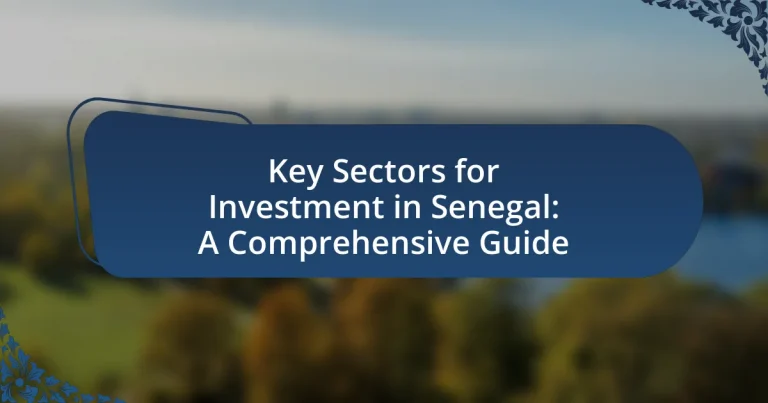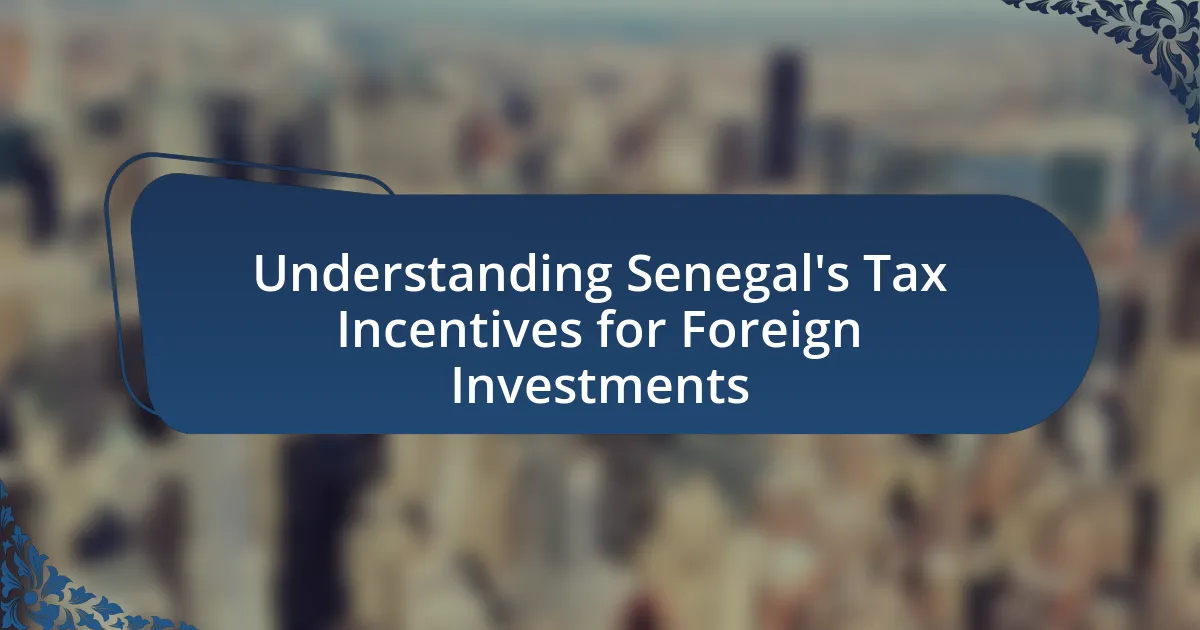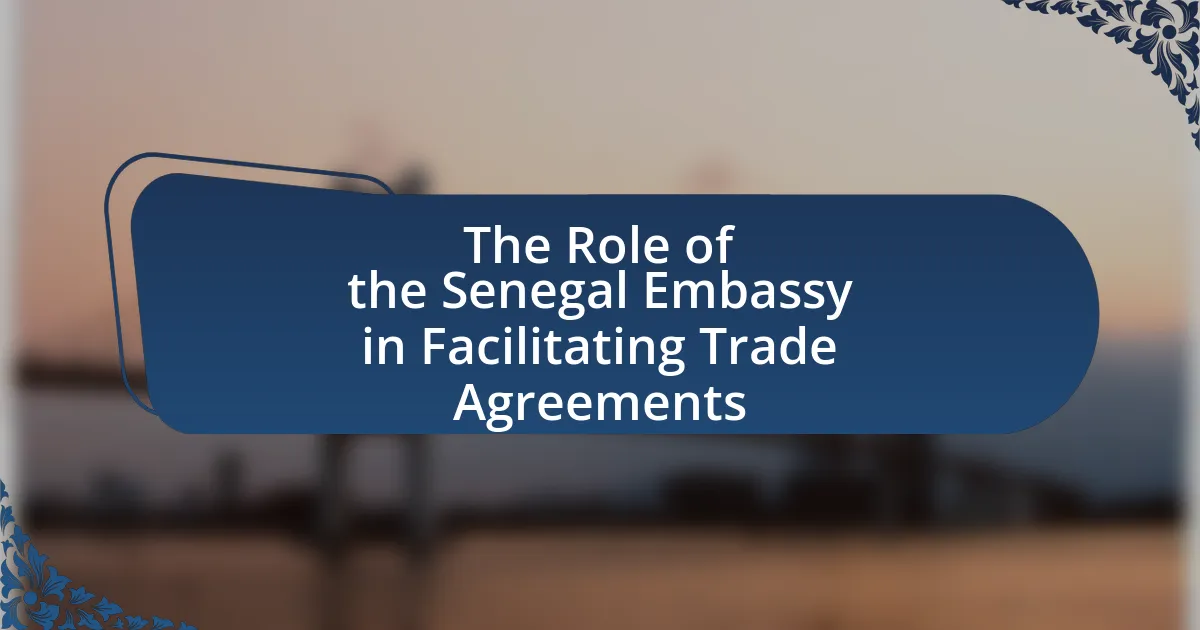The article focuses on key sectors for investment in Senegal, highlighting agriculture, energy, infrastructure, tourism, and information and communication technology (ICT) as primary areas of opportunity. It outlines the factors that make Senegal an attractive destination for foreign investment, including political stability, economic growth, and government reforms aimed at improving the business climate. The article also discusses the challenges investors may face, such as bureaucratic inefficiencies and infrastructure limitations, while providing strategies for navigating the investment landscape, including understanding local regulations and engaging with local businesses. Overall, it serves as a comprehensive guide for potential investors looking to capitalize on Senegal’s economic potential.
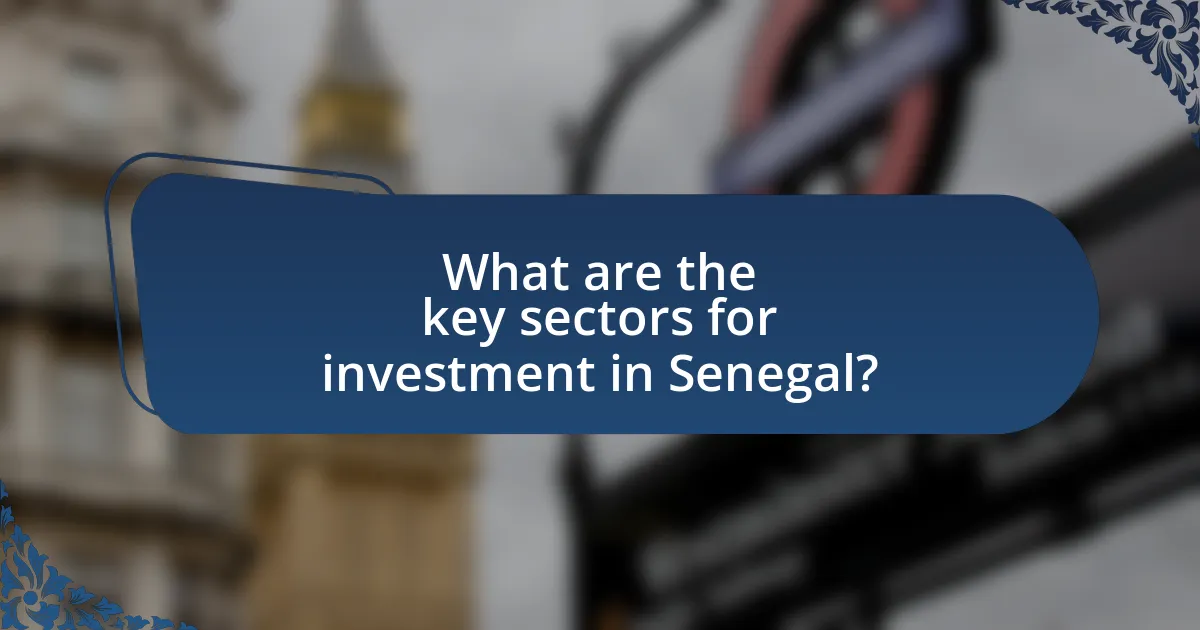
What are the key sectors for investment in Senegal?
The key sectors for investment in Senegal include agriculture, energy, infrastructure, tourism, and information and communication technology (ICT). Agriculture remains a cornerstone of the economy, contributing significantly to GDP and employment, with the government promoting initiatives to enhance productivity and sustainability. The energy sector is rapidly expanding, particularly with investments in renewable energy sources like solar and wind, aiming to increase access to electricity and reduce reliance on fossil fuels. Infrastructure development is crucial, with ongoing projects in transportation and urban development to support economic growth. The tourism sector is also a focus, leveraging Senegal’s rich cultural heritage and natural beauty to attract international visitors. Finally, the ICT sector is growing, driven by increased internet penetration and mobile technology, fostering innovation and entrepreneurship. These sectors are supported by government policies aimed at attracting foreign direct investment and fostering economic diversification.
Why is Senegal an attractive destination for investment?
Senegal is an attractive destination for investment due to its stable political environment, strategic geographic location, and growing economy. The country has experienced consistent economic growth, averaging around 6% annually over the past decade, driven by sectors such as agriculture, mining, and tourism. Additionally, Senegal’s government has implemented various reforms to enhance the business climate, including the Plan Senegal Emergent, which aims to promote infrastructure development and attract foreign direct investment. The presence of a young and dynamic workforce further supports the potential for investment returns.
What economic factors contribute to Senegal’s investment appeal?
Senegal’s investment appeal is primarily driven by its stable political environment, strategic geographic location, and growing economy. The country has maintained a democratic governance structure since 2000, which fosters investor confidence. Additionally, Senegal’s location along the West African coast provides access to regional markets and trade routes. The economy has shown resilience, with a GDP growth rate averaging around 6% in recent years, supported by sectors such as agriculture, mining, and tourism. Furthermore, the government has implemented policies to attract foreign direct investment, including tax incentives and infrastructure development, which enhance the overall investment climate.
How does political stability influence investment opportunities in Senegal?
Political stability significantly enhances investment opportunities in Senegal by creating a predictable and secure environment for investors. A stable political climate reduces risks associated with sudden policy changes, civil unrest, or economic instability, which are critical factors for foreign direct investment (FDI). For instance, Senegal has maintained a relatively stable democratic government since its independence in 1960, which has fostered investor confidence and attracted substantial FDI, particularly in sectors like energy, agriculture, and infrastructure. According to the World Bank, Senegal’s political stability has contributed to an average annual GDP growth rate of around 6% in recent years, further demonstrating the positive correlation between political stability and investment attractiveness.
What are the primary sectors attracting foreign investment?
The primary sectors attracting foreign investment in Senegal are agriculture, energy, mining, and tourism. Agriculture remains a cornerstone, with significant investments in cash crops like peanuts and horticulture, contributing to economic growth. The energy sector, particularly renewable energy projects, has seen increased foreign interest, driven by Senegal’s commitment to sustainable development and energy independence. Mining, especially in gold and phosphates, attracts substantial foreign capital due to the country’s rich mineral resources. Lastly, tourism is bolstered by Senegal’s cultural heritage and natural beauty, drawing investments in hospitality and infrastructure. These sectors collectively enhance Senegal’s economic landscape and offer lucrative opportunities for foreign investors.
How does the agriculture sector present investment opportunities?
The agriculture sector presents investment opportunities through its potential for growth, diversification, and increasing demand for food products. In Senegal, agriculture contributes approximately 15% to the GDP and employs about 70% of the population, indicating a significant economic role. The sector is poised for expansion due to factors such as favorable climatic conditions, government support for agricultural initiatives, and a growing population that drives food demand. Additionally, investments in technology and infrastructure can enhance productivity and sustainability, making agriculture a viable area for both local and foreign investors.
What role does the energy sector play in Senegal’s economic growth?
The energy sector is crucial for Senegal’s economic growth as it underpins industrial development and attracts foreign investment. The government has prioritized energy infrastructure, leading to projects like the Senegal Emerging Plan, which aims to increase electricity access from 60% to 100% by 2025. This expansion is expected to boost GDP by facilitating business operations and improving productivity. Additionally, the discovery of significant offshore oil and gas reserves, such as the Greater Tortue Ahmeyim project, is projected to generate substantial revenue, further enhancing economic stability and growth.
Why is tourism considered a vital sector for investment in Senegal?
Tourism is considered a vital sector for investment in Senegal due to its significant contribution to the country’s economy and employment. In 2019, tourism accounted for approximately 7.2% of Senegal’s GDP and supported around 200,000 jobs, highlighting its role as a key driver of economic growth. The country’s rich cultural heritage, diverse landscapes, and historical sites, such as Gorée Island and the Pink Lake, attract millions of international visitors annually, further emphasizing the sector’s potential for expansion and investment opportunities.
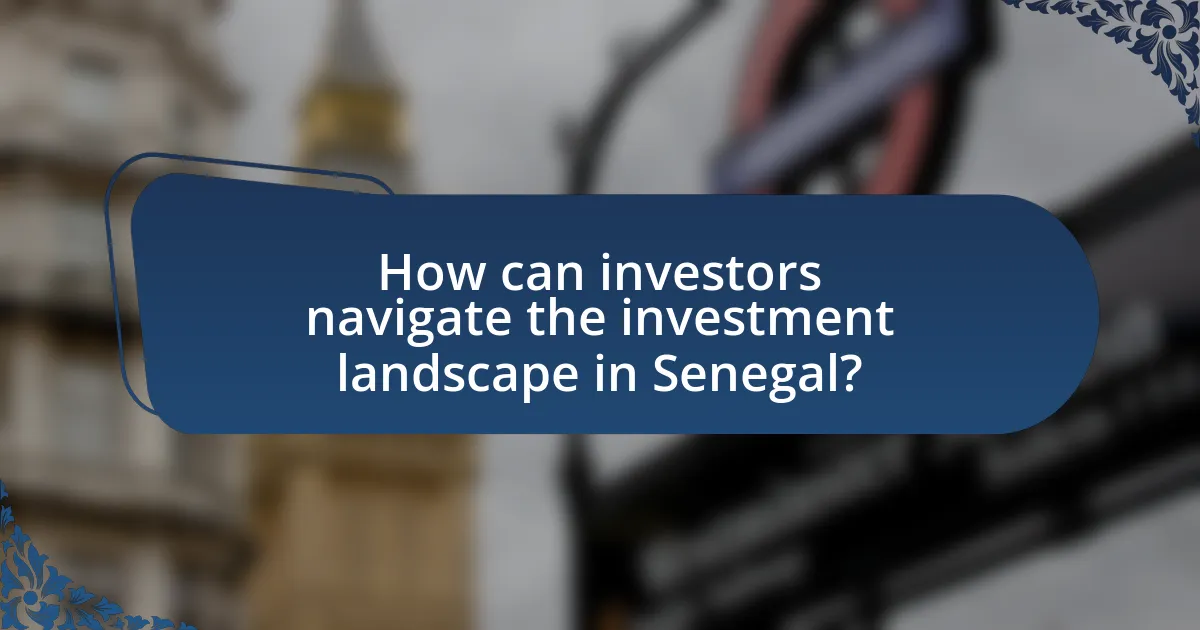
How can investors navigate the investment landscape in Senegal?
Investors can navigate the investment landscape in Senegal by conducting thorough market research, understanding local regulations, and leveraging government incentives. The Senegalese government has established a favorable investment climate, highlighted by the Investment Code, which offers tax exemptions and guarantees property rights. Additionally, sectors such as agriculture, renewable energy, and infrastructure are prioritized for investment, supported by initiatives like the Plan Senegal Emergent, which aims to boost economic growth and attract foreign capital. Understanding these frameworks and sectors enables investors to make informed decisions and capitalize on opportunities within the Senegalese market.
What legal frameworks govern investment in Senegal?
The legal frameworks governing investment in Senegal include the Investment Code, which provides incentives and protections for foreign investors, and the OHADA Treaty, which harmonizes business laws across several West African countries. The Investment Code, established in 2004 and revised in 2012, offers tax exemptions and guarantees against expropriation, thereby fostering a favorable investment climate. The OHADA Treaty, signed in 1993, facilitates legal certainty and efficiency in commercial transactions, enhancing the overall business environment in Senegal.
What are the key regulations that investors should be aware of?
Key regulations that investors should be aware of in Senegal include the Investment Code, which provides incentives such as tax exemptions and guarantees for foreign investments. Additionally, the OHADA (Organization for the Harmonization of Business Law in Africa) framework standardizes business laws across member states, ensuring legal certainty. The Senegalese government also enforces regulations related to environmental protection and labor laws, which investors must comply with to operate legally. These regulations are crucial for maintaining a stable investment environment and protecting investor rights.
How do investment incentives impact foreign direct investment?
Investment incentives significantly enhance foreign direct investment (FDI) by creating a more attractive environment for international investors. These incentives, which can include tax breaks, grants, and regulatory exemptions, lower the cost of doing business and increase potential returns on investment. For instance, countries that offer substantial tax holidays or reduced corporate tax rates often see a marked increase in FDI inflows, as evidenced by data from the World Bank, which indicates that nations with favorable investment climates attract up to 30% more FDI compared to those without such incentives. Additionally, investment incentives can lead to job creation and technology transfer, further solidifying the economic benefits associated with increased foreign investment.
What are the challenges investors may face in Senegal?
Investors in Senegal may face challenges such as bureaucratic inefficiencies, regulatory uncertainty, and infrastructure deficits. Bureaucratic inefficiencies can lead to delays in obtaining necessary permits and licenses, which hampers project timelines. Regulatory uncertainty arises from frequent changes in laws and policies, making it difficult for investors to plan long-term. Additionally, infrastructure deficits, particularly in transportation and energy, can increase operational costs and limit market access. According to the World Bank, Senegal ranks 123rd out of 190 countries in the ease of doing business, highlighting these challenges.
How can infrastructure limitations affect investment decisions?
Infrastructure limitations can significantly hinder investment decisions by increasing operational costs and reducing potential returns. For instance, inadequate transportation networks can lead to delays in the supply chain, making it difficult for businesses to deliver products efficiently. According to the World Bank, countries with poor infrastructure can experience a 40% increase in logistics costs, which directly impacts profitability and attractiveness to investors. Additionally, limited access to reliable energy sources can deter investments in sectors such as manufacturing and technology, where consistent power supply is crucial for operations. Thus, infrastructure deficiencies create barriers that can lead investors to seek opportunities in regions with more robust support systems.
What are the common bureaucratic hurdles for investors in Senegal?
Common bureaucratic hurdles for investors in Senegal include lengthy administrative processes, complex regulatory frameworks, and inconsistent enforcement of laws. Investors often face delays in obtaining necessary permits and licenses, which can extend project timelines significantly. Additionally, the lack of transparency in government procedures can lead to uncertainty and increased costs. According to the World Bank’s Doing Business report, Senegal ranks 123rd out of 190 countries in ease of doing business, highlighting these challenges. Furthermore, corruption and the need for informal payments can complicate interactions with public officials, further deterring investment.
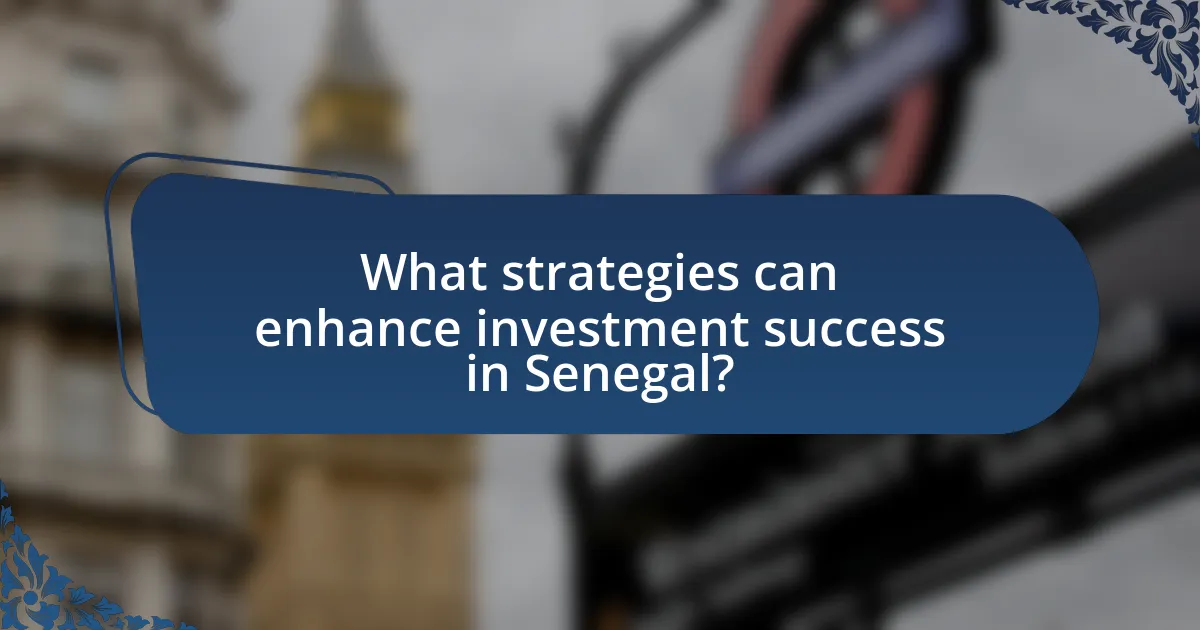
What strategies can enhance investment success in Senegal?
To enhance investment success in Senegal, investors should focus on thorough market research, strategic partnerships, and understanding local regulations. Conducting comprehensive market research allows investors to identify opportunities and risks specific to Senegal’s economic landscape, which is crucial given the country’s growth in sectors like agriculture, renewable energy, and technology. Forming strategic partnerships with local businesses can facilitate market entry and provide valuable insights into consumer behavior and preferences. Additionally, understanding and complying with local regulations, such as tax incentives and investment codes, can significantly improve the likelihood of successful investments. For instance, Senegal’s Plan Senegal Emergent aims to attract foreign investment by offering various incentives, which underscores the importance of aligning investment strategies with national development goals.
How can investors identify the best opportunities in Senegal?
Investors can identify the best opportunities in Senegal by analyzing key sectors such as agriculture, renewable energy, and infrastructure development. The Senegalese government has prioritized these sectors for growth, evidenced by the Plan Senegal Emergent, which aims to boost economic development and attract foreign investment. Additionally, the World Bank reported that Senegal’s GDP growth rate was 6.1% in 2021, indicating a robust economic environment conducive to investment. Investors should also consider engaging with local business networks and attending investment forums to gain insights into emerging opportunities and market trends.
What resources are available for market research in Senegal?
In Senegal, resources available for market research include government agencies, local and international consulting firms, and online databases. The National Agency for Statistics and Demography (ANSD) provides demographic and economic data essential for market analysis. Additionally, organizations like the Senegalese Chamber of Commerce offer insights into various sectors. Consulting firms such as Deloitte and PwC also conduct market studies and provide reports specific to Senegal. Online platforms like Statista and Euromonitor International offer access to market reports and statistics relevant to the Senegalese market. These resources collectively support informed decision-making for investors and businesses operating in Senegal.
How can networking with local businesses facilitate investment?
Networking with local businesses can facilitate investment by creating opportunities for collaboration, sharing resources, and building trust within the community. When businesses connect, they can identify mutual interests and leverage each other’s strengths, which can lead to joint ventures or partnerships that attract investors. For instance, local businesses often have insights into market trends and consumer behavior, which can be invaluable for potential investors looking to enter a new market. Additionally, strong local networks can enhance credibility, as investors are more likely to invest in regions where businesses demonstrate a cohesive and supportive ecosystem. This is supported by studies showing that regions with robust business networks tend to experience higher levels of investment and economic growth.
What best practices should investors follow in Senegal?
Investors in Senegal should conduct thorough market research and understand local regulations to ensure successful investments. Understanding the economic landscape, including key sectors such as agriculture, mining, and tourism, allows investors to identify opportunities and risks. Additionally, engaging with local partners and stakeholders can facilitate smoother operations and compliance with legal requirements. According to the World Bank, Senegal’s GDP growth rate was 6.1% in 2021, indicating a robust economic environment for investment. Furthermore, the Senegalese government has implemented reforms to improve the business climate, as evidenced by its ranking of 123rd in the World Bank’s Ease of Doing Business Index 2020.
How important is understanding local culture and business practices?
Understanding local culture and business practices is crucial for successful investment in Senegal. This understanding facilitates effective communication, builds trust, and enhances relationships with local partners and stakeholders. For instance, Senegal’s business environment is influenced by its cultural values, such as respect for hierarchy and the importance of personal relationships in business dealings. Research indicates that companies that adapt to local customs and practices are more likely to succeed; a study by the World Bank highlights that culturally aware businesses experience higher rates of project success and stakeholder satisfaction.
What role does due diligence play in successful investments?
Due diligence is critical in successful investments as it involves thorough research and analysis of potential investment opportunities to assess risks and validate the viability of the investment. This process helps investors identify financial, operational, and legal issues that could impact the investment’s performance. For instance, a study by the Harvard Business Review highlights that companies that conduct comprehensive due diligence are 30% less likely to experience significant post-acquisition issues, demonstrating the importance of this practice in mitigating risks and ensuring informed decision-making.
What are the key takeaways for potential investors in Senegal?
Potential investors in Senegal should focus on the country’s growing economy, strategic location, and favorable investment climate. Senegal’s GDP growth rate was approximately 6.1% in 2022, driven by sectors such as agriculture, mining, and tourism. The government has implemented reforms to enhance the business environment, including the Senegal Emerging Plan, which aims to attract foreign direct investment. Additionally, Senegal’s membership in the West African Economic and Monetary Union provides access to a larger market. These factors collectively create a promising landscape for investment opportunities.
